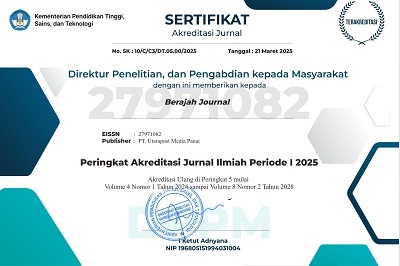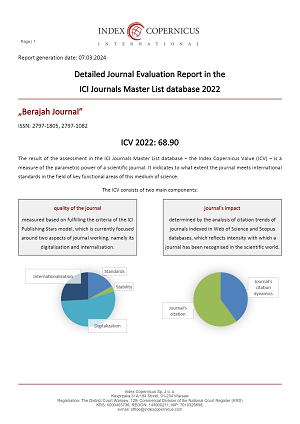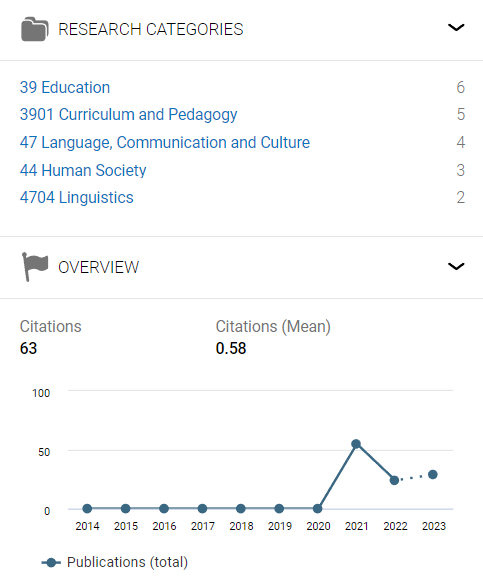PENGARUH WORKPLACE INCIVILITY TERHADAP TURNOVER INTENTION DENGAN NEGATIVE RUMINATION SEBAGAI VARIABEL MEDIATOR
DOI:
https://doi.org/10.47353/bj.v2i3.133Keywords:
negative rumination, turnover intention, workplace incivilityAbstract
Penelitian ini bertujuan untuk mengetahui pengaruh workplace incivility terhadap turnover intention dengan negative rumination sebagai variabel mediator. Penelitian menggunakan metode kuantitatif dengan menggunakan teknik survei. Penelitian dilakukan dengan menyebar kuesioner secara online. Terdapat sampel sejumlah 109 orang karyawan di instansi perbankan di Indonesia yang menjadi responden dalam penelitian ini. Analisis data dilakukan dengan uji regresi menggunakan bantuan aplikasi IBM SPSS Statistics 25 for Windows dan Sobel Test. Hasil regresi untuk menguji pengaruh menunjukkan nilai signifikansi <0,05 sehingga hasil dinyatakan signifikan. Uji sobel test untuk menguji efek mediasi menghasilkan nilai 2,826 atau >1,98 sehingga hasil dinyatakan memediasi. Selain itu, diketahui bahwa nilai dari pengaruh langsung workplace incivility terhadap turnover intention ialah sebesar 0,889 dan nilai dari pengaruh workplace incivility terhadap turnover intention melalui negative rumination ialah sebesar 0,779. Adapun efek mediasi yang terjadi adalah mediasi parsial. Hal ini menunjukkan bahwa kedua hipotesis diterima, yaitu terdapat pengaruh workplace incivility terhadap turnover intention dan terdapat efek mediasi negative rumination pada pengaruh workplace incivility terhadap turnover intention.
Downloads
References
Andersson, L. M., & Pearson, C. M. (1999). Tit for tat? The spiraling effect of incivility in the workplace. Acad Manag Rev, 24(3), 452–471.
Bothma, C. F. C., & Roodt, G. (2013). The validation of the turnover intention scale. SA Journal of Human Resource Management, 11(1), 1–12. https://doi.org/10.4102/sajhrm.v11i1.507
Chaudhary, R., Lata, M., & Firoz, M. (2021). Workplace incivility and its socio-demographic determinants in India. International Journal of Conflict Management, 33, (3), 357–384.
Clark, C. M., & Davis Kenaley, B. L. (2011). Faculty empowerment of students to foster civility in nursing education: A merging of two conceptual models. Nursing Outlook, 59(3), 158–165. https://doi.org/10.1016/j.outlook.2010.12.005
Frone, M. R. (2015). Relations of negative and positive work experiences to employee alcohol use: Testing the intervening role of negative and positive work rumination. Journal of Occupational Health Psychology, 20(2), 148–160. https://doi.org/10.1037/a0038375
Handoyo, S., Samian, Syarifah, D., & Suhariadi, F. (2018). The measurement of workplace incivility in indonesia: Evidence and construct validity. Psychology Research and Behavior Management, 11, 217–226. https://doi.org/10.2147/PRBM.S163509
He, Y., Walker, J. M., Payne, S. C., & Miner, K. N. (2021). Explaining the negative impact of workplace incivility on work and non-work outcomes: The roles of negative rumination and organizational support. Stress and Health, 37(2), 297–309. https://doi.org/10.1002/smi.2988
Hom, P. W., Griffeth, R. W., & Sellaro, C. L. (1984). The validity of Mobley ’ s ( 1977 ) turnover model. Organizational Behavior and Human Performance, 34, 141–174.
Imelda, & Rekan. (2019). Generasi milenial dalam industri 4.0: berkah bagi sumber daya manusia Indonesia atau ancaman? Deloitte Indonesia Perspective, edisi pertama, 25–36. https://www2.deloitte.com/content/dam/Deloitte/id/Documents/about-deloitte/id-about-dip-edition-1-chapter-2-id-sep2019.pdf
Lim, S., Cortina, L. M., & Magley, V. J. (2008). Personal and Workgroup Incivility: Impact on Work and Health Outcomes. Journal of Applied Psychology, 93(1), 95–107. https://doi.org/10.1037/0021-9010.93.1.95
Miner-Rubino, K., & Reed, W. D. (2010). Testing a Moderated Mediational Model of Workgroup Incivility: The Roles of Organizational Trust and Group Regard. Journal of Applied Social Psychology, 40(12), 3148–3168. https://doi.org/10.1111/j.1559-1816.2010.00695.x
Mobley, W. H., Griffeth, R. W., Hand, H. H., & Meglino, B. M. (1979). Review and conceptual analysis of the employee turnover process. Psychological Bulletin, 86(3), 493–522. https://doi.org/10.1037/0033-2909.86.3.493
Mullen, P. R., Backer, A., Chae, N., & Li, H. (2020). School Counselors’ Work-Related Rumination as a Predictor of Burnout, Turnover Intentions, Job Satisfaction, and Work Engagement. Professional School Counseling, 24(1), 2156759X2095725. https://doi.org/10.1177/2156759x20957253
Namin, B. H., Øgaard, T., & Røislien, J. (2022). Workplace incivility and turnover intention in organizations: A meta-analytic review. International Journal of Environmental Research and Public Health, 19(1). https://doi.org/10.3390/ijerph19010025
Panic, A., Przulj, N., & Tchantouridze, L. (2018). Millenials Employee Turnover Intention in Indonesia. Innovative Issues and Approaches in Social Sciences, 11(3).
Pradipto, Y. D., & Nabila. (2021). The Effect of Work Satisfaction on Turnover Intention in Millenials Generation in Indonesia Unicorn Company with work engagement as Moderating Variable. IOP Conference Series: Earth and Environmental Science.
Prahadi, Y. Y. (2015, September 21). Turnover Talent Tinggi, Ini Dia Pemicunya. Diambil kembali dari swa.co.id: https://swa.co.id/swa/business-strategy/turnover-talent-tinggi-ini-dia-pemicunya-survei
PwC. (2014). Indonesian Banking Survey 2014. Retrieved from www.pwc.com: https://www.pwc.com/id/en/publications/assets/indonesian-banking-survey2014.pdf
Riadi, S. S., Hendryadi, & Tricahyadinata, I. (2019). Workplace Incivility, Self-Efficacy, and Turnover Intention Relationship Model: a Multi-Group Analysis. Russian Journal of Agricultural and Socio-Economic Sciences, 85(1), 358–368. https://doi.org/10.18551/rjoas.2019-01.44
Robert Walters. (2020). Salary Survey 2020 - Portugal. 1–56.
Spence Laschinger, H. K., Leiter, M., Day, A., & Gilin, D. (2009). Workplace empowerment, incivility, and burnout: Impact on staff nurse recruitment and retention outcomes. Journal of Nursing Management, 17(3), 302–311. https://doi.org/10.1111/j.1365-2834.2009.00999.x
Tanner, A., Voon, D., Hasking, P., & Martin, G. (2013). Underlying structure of ruminative thinking: Factor analysis of the ruminative thought style questionnaire. Cognitive Therapy and Research, 37(3), 633–646. https://doi.org/10.1007/s10608-012-9492-1
Yuniasanti, R., Binti Abas, N. A., & Hamzah, H. (2019). Employee turnover Intention among Millennials: The Role of Psychological Well-Being and Experienced Workplace Incivility. HUMANITAS: Indonesian Psychological Journal, 16(2). doi:https://doi.org/10.26555/humanitas.v16i2.12544
Downloads
Published
How to Cite
Issue
Section
License
Copyright (c) 2022 Hamidah Yulia Mustika Setyorini, Dewi Syarifah

This work is licensed under a Creative Commons Attribution 4.0 International License.




























